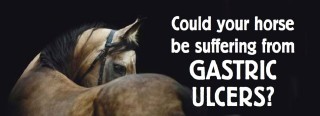As part of this year’s Gastric Ulcer Awareness Month (GUAM) in May Liphook Equine Hospital are holding a gastroscopy clinic for clients who suspect their horse may have ulcers, or believe them to be at risk.
A gastroscopy usually costs around £180.00 but sponsorship from Merial Equine means that for horses attending the scoping day we can offer it free of charge.
Gastric ulcers are thought to be one of the most under-recognised conditions in horses: With a prevalence of 60% in performance horses and 40% in leisure horses, it’s important that those with the condition are diagnosed and treated.
Horses are designed as trickle feeders and so, unlike humans, they produce gastric acid continuously even when they are not eating. Ad lib forage and associated saliva production will help to neutralise the acid, however stabling, exercise, feeding regimes and stress can leave the stomach vulnerable to ulcers developing.
Signs of ulcers can include some or all of the following: Reluctance to work or jump; dull ‘starey’ coat; poor or picky appetite; weight loss; colic; discomfort on girth tightening and salivation and teeth grinding in foals.
The clinic is being held on Tuesday 27th May 2014 at Liphook Equine Hospital. If you would like to bring your horse along, please call Julie Paddock on 01428 727200 to book a place – booking is essential. Places are limited and will be secured on a first come first served basis.
For more information you can also visit the practice website on www.theleh.co.uk
(Please note the cost of sedation and gastroguard is not included)
A gastroscopy usually costs around £180.00 but sponsorship from Merial Equine means that for horses attending the scoping day we can offer it free of charge.
Gastric ulcers are thought to be one of the most under-recognised conditions in horses: With a prevalence of 60% in performance horses and 40% in leisure horses, it’s important that those with the condition are diagnosed and treated.
Horses are designed as trickle feeders and so, unlike humans, they produce gastric acid continuously even when they are not eating. Ad lib forage and associated saliva production will help to neutralise the acid, however stabling, exercise, feeding regimes and stress can leave the stomach vulnerable to ulcers developing.
Signs of ulcers can include some or all of the following: Reluctance to work or jump; dull ‘starey’ coat; poor or picky appetite; weight loss; colic; discomfort on girth tightening and salivation and teeth grinding in foals.
The clinic is being held on Tuesday 27th May 2014 at Liphook Equine Hospital. If you would like to bring your horse along, please call Julie Paddock on 01428 727200 to book a place – booking is essential. Places are limited and will be secured on a first come first served basis.
For more information you can also visit the practice website on www.theleh.co.uk
(Please note the cost of sedation and gastroguard is not included)
